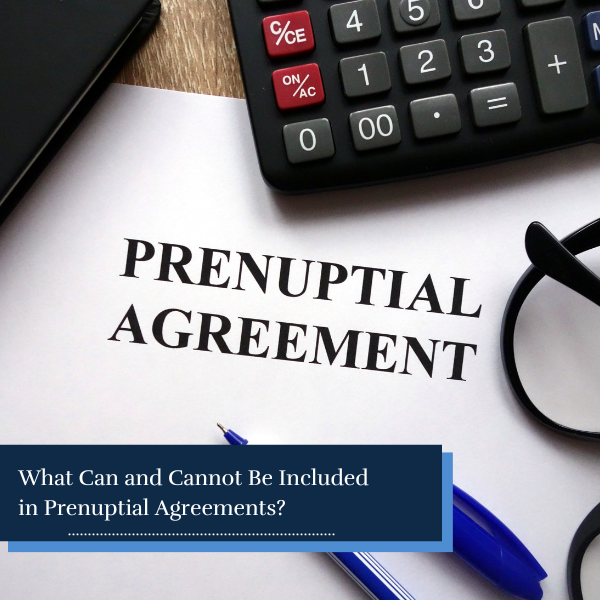
Prenuptial agreements can be a touchy subject, as some people see them as a sign of instability or mistrust in a relationship.
However, this misconception is often far from the truth. There are situations when it makes sense for couples to have a prenuptial agreement in place before getting married, especially if one spouse has significantly more assets than the other.
When drafted and implemented correctly, a prenup can make marriage less contentious by making certain expectations and terms explicit. It can also protect your and your assets and make divorce proceedings less complicated if the marriage breaks down.
But what does a prenup cover?
If you and your partner are considering signing a prenuptial agreement, it is important to know what you can and cannot include in the document. The Michigan family law attorneys at Alward Fisher have helped many couples draft prenuptial agreements and can help you understand what to cover in yours.
To learn more about what to include in a prenup, contact us today for a free consultation with an experienced Michigan prenuptial agreement lawyer.
What Can Be Included in a Prenup?
In Michigan, a prenuptial agreement can cover many issues a couple may face during divorce or separation. As long as the agreement is drafted correctly, it can cover issues such as the following:
- Division of property and assets – One of the most common points of contention in a divorce or separation is how the couple’s shared assets will be divided. Without a prenuptial agreement, couples going through a divorce must divide their shared property in an “equitable” manner — which does not necessarily mean a 50/50 split. By spelling out the terms of how your marital assets will be divided ahead of time, you and your spouse can potentially save yourselves a lot of time, energy, and money down the road.
- Retirement accounts – For many couples, the issue of whether each spouse will keep their respective retirement accounts or divide them in some way can significantly impact each spouse’s financial future. Spelling out how retirement accounts will be divided ahead of time in a prenup can protect both you and your spouse in the event of a divorce.
- Alimony – Spousal support, more commonly referred to as alimony, is another heated issue in virtually any divorce. A prenuptial agreement can lay out the terms for alimony in the event of a divorce and save everyone time and heartache.
- Life insurance – As with retirement accounts, life insurance policies can greatly impact your finances and must be accounted for in a divorce. A prenuptial agreement can include terms specifying how the proceeds from your life insurance policies will be divided.
- Business interests – If you or your spouse have an ownership stake in a business, you need to plan for what will happen to the business in case of a divorce. This is something you can include as part of a prenuptial agreement.
- Debts – Which spouse will take care of any shared or individual debts is another key issue in many divorces. You can prevent these problems by specifying how your debts will be addressed in a prenuptial agreement.
What Cannot Be Included in a Prenuptial Agreement?
The main points that cannot be included in a prenuptial agreement are any terms concerning child support and custody for any children from the marriage. A prenup can include provisions for child support and custody for children from previous relationships but not for any children in the current relationship.
This is because child support and custody decisions must be made according to what is best for the child when a couple files for divorce in Michigan. Judges need to be able to make child support and custody rulings without having to worry about prior arrangements between spouses.
As prenuptial agreements are primarily concerned with property and assets, there are a few other matters concerning personal preferences that cannot be included in these documents, such as:
- Which spouse will do what chores
- How children will be raised
- Where spouses or children will spend holidays
- Relationships with relatives outside of immediate family
Michigan Laws Regarding Prenuptial Agreements
Most of Michigan’s laws regarding prenuptial agreements deal with how a prenup must be drafted. For a prenup to be legally enforceable, the following conditions must be met:
- The terms of the prenup are reasonable, fair, and equitable
- Both parties signed the agreement prior to the marriage, voluntarily and without undue influence or fraud
- Both parties understood the terms of the prenup and were mentally competent to sign a contract
- Both parties fully disclosed their assets before signing the prenup
When you disclose your assets before signing a prenuptial agreement, you must include:
- A full list of your assets and their value
- The amount of any debts you have
- Any prior child support obligations you may have
- Any prior alimony obligations you may have
- Your annual income and its source
- Your educational background
- Your employment status
- Your age and health status
If you are worried about the validity of your prenuptial agreement, we recommend consulting with an experienced Michigan family lawyer. While you could draft a prenup on your own, working with a lawyer gives you the peace of mind that your agreement is enforceable and meets the requirements under Michigan law.
Want to Know More About Prenups? Talk to Our Experienced Prenuptial Agreement Lawyers in Traverse City, MI Today
Prenuptial agreements are a complicated and emotional subject. You should seek advice from an attorney before drafting or signing any documents. The Traverse City family law attorneys at Alward Fisher have helped many couples with prenuptial agreements and would be happy to meet with you to discuss your concerns.
For more help on what is included in a prenuptial agreement, contact us today for a free consultation.
- About the Author
- Latest Posts


